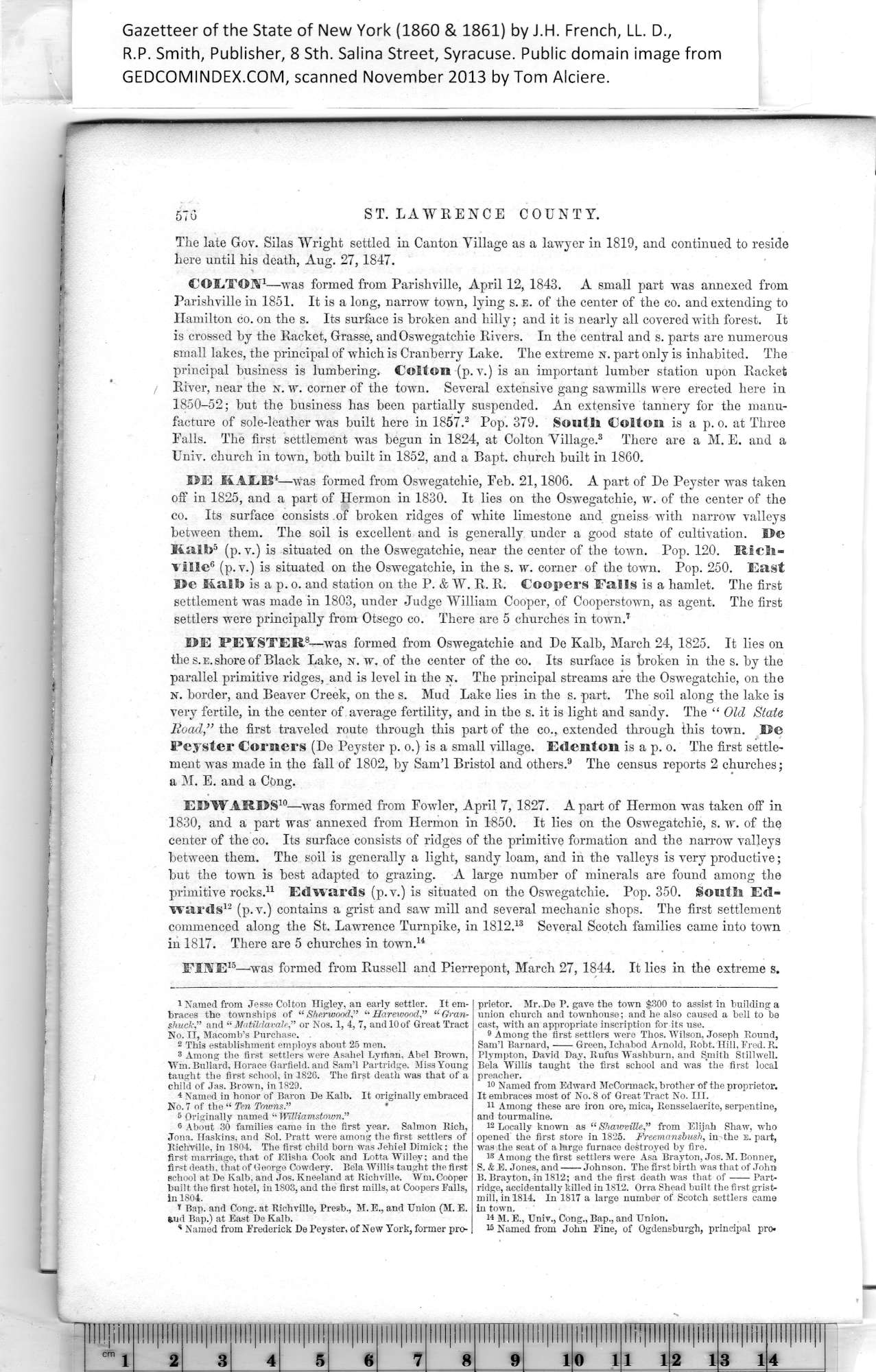|
576 ST. LAWRENCE COUNTY.
The late Oov. Silas Wright settled in Canton Tillage as a lawyer in 1819, and continued to reside
here until his death, Aug. 27,1847.
COLTOBf1 —was formed from Parish ville, April 12, 1843. A small part was annexed from
Parishville in 1851. It is a long, narrow town, lying s. e. of the center of the co. and extending to
Hamilton co. on the s. Its surface is broken and hilly; and it is nearly all covered with forest. It
is crossed by the Racket, Grasse, and Oswegatchie Rivers. In the central and s. parts are numerous
small lakes, the principal of which is Cranberry Lake. The extreme n. part only is inhabited. The
principal business is lumbering. Colton (p.v.) is an important lumber station upon Racket
River, near the n. w. corner of the town. Several extensive gang sawmills were erected here in
1850-52; but the business has been partially suspended. An extensive tannery for the manu¬
facture of sole-leather was built here in 1857.2 Pop. 379. South Coltou is a p. o. at Three
Falls. The first settlement was begun in 1824, at Colton Village.3 There are a M. E. and a
Univ. church in town, both built in 1852, and a Rapt, church built in 1860.
HE MALE 2—was formed from Oswegatchie, Feb. 21,1806. A part of De Peyster was taken
off in 1825, and a part of Hermon in 1830. It lies on the Oswegatchie, w. of the center of the
co. Its surface consists of broken ridges of white limestone and gneiss with narrow valleys
between them. The soil is excellent and is generally under a good state of cultivation. He
K.alt>5 (p. v.) is situated on the Oswegatchie, near the center of the town. Pop. 120. Rleli-
Ville6 (p. v.) is situated on the Oswegatchie, in the s. w. corner of the town. Pop. 250. East
He fkalto is a p. o. and station on the P. & W. R. R. Coopers Falls is a hamlet. The first
settlement was made in 1803, under Judge William Cooper, of Cooperstown, as agent. The first
settlers were principally from Otsego co. There are 5 churches in town.3
HE PEYSTER8— was formed from Oswegatchie and De Kalb, March 24, 1825. It lies on
the s. e. shore of Black Lake, n. w. of the center of the co. Its surface is broken in the s. by the
parallel primitive ridges, and is level in the n. The principal streams are the Oswegatchie, on the
n. border, and Beaver Creek, on the s. Mud Lake lies in the s. part. The soil along the lake is
very fertile, in the center of average fertility, and in the s. it is light and sandy. The “ Old State
Road,” the first traveled route through this part of the co., extended through this town. He
Peyster Corners (De Peyster p. o.) is a small village. Edenton is a p. o. The first settle¬
ment was made in the fall of 1802, by Sam’l Bristol and others.4 The census reports 2 churches;
a M. E. and a Cong.
EBWAEDS5—was formed from Fowler, April 7, 1827. A part of Hermon was taken off in
1830, and a part was annexed from Hermon in 1850. It lies on the Oswegatchie, s. w. of the
center of the co. Its surface consists of ridges of the primitive formation and the narrow valleys
between them. The soil is generally a light, sandy loam, and in the valleys is very productive;
but the town is best adapted to grazing. A large number of minerals are found among the
primitive rocks.6 Edwards (p.v.) is situated on the Oswegatchie. Pop. 350. South Ed¬
wards12 (p. v.) contains a grist and saw mill and several mechanic shops. The first settlement
commenced along the St. Lawrence Turnpike, in 1812.13 Several Scotch families came into town
in 1817. There are 5 churches in town.14
FIME 15—was formed from Russell and Pierrepont, March 27, 1844. It lies in the extreme s.
|
prietor. Mr. De P. gave the town $300 to assist in building a
union church and townhouse; and he also caused a bell to be
cast, with an appropriate inscription for its use.
9 Among the first settlers were Thos. Wilson, Joseph Round,
SamT Barnard, Green, Ichahod Arnold, Robt. Hill, Fred. R,
Plympton, David Day, Rufus Washburn, and Smith Stillwell.
Bela Willis taught the first school and was the first local
preacher.
1° Named from Edward McCormack, brother of the proprietor.
It embraces most of No. 8 of Great Tract No. III.
H Among these are iron ore, mica, Rensselaerite, serpentine,
and tourmaline.
i2 Locally known as “ Shaiovitte,” from Elijah Shaw, who
opened the first store in 1825. Freemansbush, in the E. part,
was the seat of a large furnace destroyed hy fire.
is Among the first settlers were Asa Brayton, Jos. M. Bonner,
S. & E. Jones, and Johnson. The first birth was that of John
B. Brayton, in 1812; and the first death was that of Part¬
ridge, accidentally killed in 1812. Orra Shead built the first grist¬
mill, in 1814. In 1817 a large number of Scotch settlers came
in town.
14 M. E., Univ., Cong., Bap., and Union.
15 Named from John Fine, of Ogdensburgh, principal pro |
1
Named from Jesse Colton Higley, an early settler. It em¬
braces the townships of “Sherwood,” “ Harewood,” “ Gran-
shuck,” and “ Matildavale,,” or Nos. 1, 4, 7, and 10 of Great Tract
No. II, Macomb’s Purchase. -
2
Named in honor of Baron De Kalb. It oi’iginally embraced
3
6 About 30 families came in the first year. Salmon Bich,
4
Richville, in 1804. The first child born was Jehiel Dimick; the
5
first marriage, that of Elisha Cook and Lotta Willey; and the
6
first death, that of George Cowdery. Bela Willis taught the first
|
